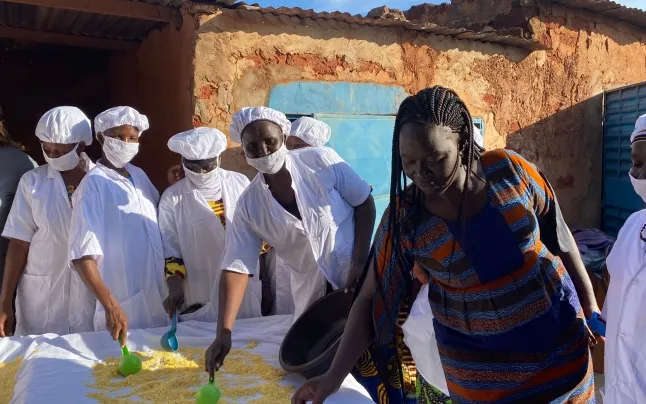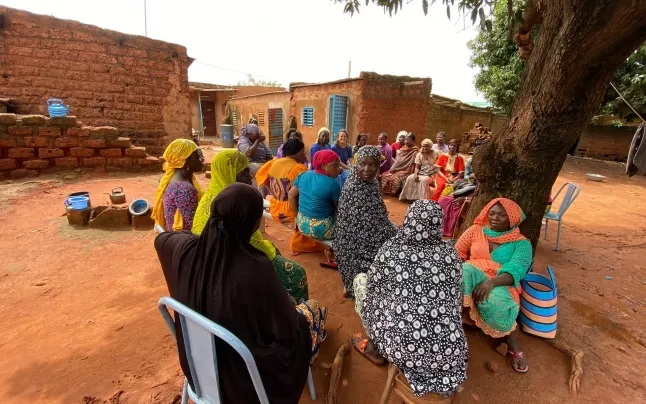The NGO NouSol works on the 'Empowerment from wisdom' project, thanks to the collaboration of the Hakilisigui Federation, to guarantee women their rights and duties.
The situation of women in Burkina Faso is very precarious. In terms of population, the number of women is higher than men, but most of them have not gone to school. Thus, the weight of the family falls on the figure of the mother, which is why they play a very important role in African society. They are in charge of feeding the family, taking care of the children, selling the products they make in the market, cooking, washing the clothes... Their lives are reduced to working hard for the family at home.
Solange Traoré, president of the Hakilisigui Federation, is the one who details the life and situation of women in Burkina Faso. The Federation is a grouping of women's associations, of work cooperatives, which fight for the emancipation and autonomy of women, to ensure that they can all fend for themselves.
A project to train and strengthen women
To fight against this situation, the NGO NouSol has been working on the ‘Empoderament des de la saviesa’ ('Empowerment from wisdom') project for a year, with the help of the Hakilisigui Federation. The goal is that women know their rights, have access to quality rights, can exercise them, live a life free of violence and decide about their own bodies. "It is exaggerated not to be able to plan how many sons and daughters you will have, to reduce your life closed at home", explains Èlia Borràs, technical cooperator of NouSol.
The project encompasses three aspects: the first, sexual and reproductive health; the second, the impact of politics on women, the struggle for them to have a presence and be able to make decisions; and the third, the improvement of production processes and the search for techniques to optimize and facilitate them. 'Empowerment for wisdom' works in the Haut-Bassins region, which is divided into the provinces of Tuy, Kénédougou and Houet. Houet, where the capital of the region, Bobo-Dioulasso, is located, is the most populated and where the project team is currently located.
The importance of exercising one's rights
Borràs states that training in sexual and reproductive health will soon begin. "I have a lot of confidence in the federation, I really know that the participants will make a lot of use of it", explains. The NouSol technician says that the trainings will be carried out by NouSol members, for example, in human rights and gender violence, as well as people from the same region, who will show improvements in production processes and different techniques, such as, for example, creating a sticker to place on the products and make visible the association to which they belong.
"We are always looking for the best person to do the training, taking into account a number of parameters. In addition, we want to create new female benchmarks", says the NouSol technician. She adds that the purpose is for women to learn to say no and decide for themselves.
An important part of the project is learning about gender-based abuse and violence: learning to detect what violent behavior and assaults are, knowing that there is the option of reporting or assimilating normalized facts, such as daily cooking by the husband, aren't common or mandatory in other parts of the world. "Cause a change and a real empowerment of the person and that she knows she isn't alone", determines Élia Borràs.
During the first year, the project has worked on its basic structure, with the help of the Hakilisigui Federation and its president, Solange Traoré. They have designed the set of activities thanks to face-to-face meetings to get to know the women's associations that belong to the Hakilisigui umbrella, approximately four hundred and twenty, throughout the Haut-Bassins region.
A country experiencing a complex situation
Burkina Faso is experiencing a problem of internal displacement. Currently, up to two million people have to flee their homes to move to other regions of the country. "The men usually stay in the villages, and it's the women with their children who leave, walking up to six hundred kilometers," details Traoré. Most of them arrive in the city of Bobo-Dioulasso.
From the Hakilisigui Federation, they fight to guarantee decent living conditions for all displaced women who arrive in the city, since they come from the rural world and find an exponential difference in habits and customs. Currently, they are working to get a field area where newly arrived women can grow and prepare their own food.
The indispensability of female empowerment
"In Burkina Faso, women do not have female references anywhere", explains Èlia Borràs. It is for this reason that, in the various meetings of the project, in which the women users of the associations participate, the importance of women speaking in public is emphasized. "They are very shy women or who are not used to giving their opinion, talking and arguing", concludes Borràs.
Today, the entire NouSol team is satisfied with the work carried out and face the future with confidence and determination, happy with the collaboration of the women who, previously, already come from a situation of cooperation and organization among themselves , because otherwise they don't survive. "Having someone from outside come, listen to you and want to work with you is already a motivation", says Borràs.









Add new comment